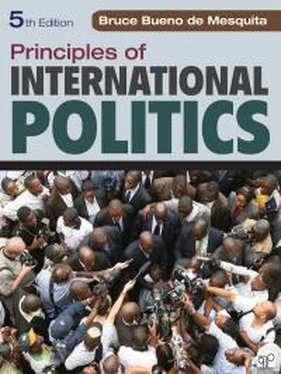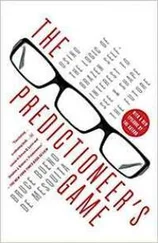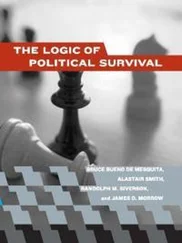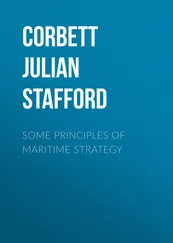5th Edition
Principles of
INTERNATIONAL
POLITICS


To the memory of Abraham and Clara Bueno de Mesquita, A. F. K. Organski, William H. Riker, and Robert Jackman. They were master mentors and exemplars of lives well lived. They taught me to reflect on how our world works for which I am forever in their debt. Though I can no longer turn to them for counsel, still I listen for their whispers on the wind.
5th Edition
Bruce Bueno de Mesquita
Principles of
INTERNATIONAL
POLITICS


FOR INFORMATION:
CQ Press
An Imprint of SAGE Publications, Inc.
2455 Teller Road
Thousand Oaks, California 91320
E-mail: order@sagepub.com
SAGE Publications Ltd.
1 Oliver’s Yard
55 City Road
London EC1Y 1SP
United Kingdom
SAGE Publications India Pvt. Ltd.
B 1/I 1 Mohan Cooperative Industrial Area
Mathura Road, New Delhi 110 044
India
SAGE Publications Asia-Pacific Pte. Ltd.
3 Church Street
#10-04 Samsung Hub
Singapore 049483
Acquisitions Editor: Elise Frasier
Production Editor: Laura Barrett
Copy Editor: Megan Markanich
Typesetter: C&M Digitals (P) Ltd.
Proofreader: Stefanie Storholt
Indexer: Kathleen Paparchontis
Cover Designer: Karine Hovsepian
Marketing Manager: Jonathan Mason
Permissions Editor: Adele Hutchinson
Copyright © 2014 by CQ Press, an Imprint of SAGE Publications, Inc. CQ Press is a registered trademark of Congressional Quarterly Inc.
All rights reserved. No part of this book may be reproduced or utilized in any form or by any means, electronic or mechanical, including photocopying, recording, or by any information storage and retrieval system, without permission in writing from the publisher.
Printed in the United States of America
Library of Congress Cataloging-in-Publication Data
Bueno de Mesquita, Bruce, 1946-
Principles of international politics / Bruce Bueno de Mesquita. — 5th ed.
p. cm.
Includes bibliographical references and index.
ISBN 978-1-4522-0298-3 (pbk.)
1. International relations. I. Title.
JZ1242.B84 2014
327.101—dc23 2012038576
This book is printed on acid-free paper.
12 13 14 15 16 10 9 8 7 6 5 4 3 2 1
Brief Contents
Maps, Tables, and Figures
Preface
About the Author
SECTION I. FOUNDATIONS
Introduction
1. Evaluating Arguments about International Politics
2. The Strategic Perspective: When Foreign Policy Collides with Domestic Politics
3. Tools for Analyzing International Affairs
4. An Introduction to Game Theory
SECTION II. WAR
5. Why War? The Big Picture
6. Domestic Theories of War
SECTION III. PEACE
7. How International Organizations Work or Don’t Work
8. Global Warming: Designing a Solution
9. Human Rights, International Law, and Norms
10. Free Trade or Fair: The Domestic Politics of Tariffs
11. Globalization: International Winners and Losers
SECTION IV. WORLD ORDER
12. Foreign Aid, Poverty, and Revolution
13. Can Terrorism Be Rational?
14. A Democratic World Order: Peace without Democratization
Appendix. Modern Political Economic History and International Politics
Bibliography
Glossary of Key Terms
Photo Credits
Citations of Key Authors
Index
Detailed Contents
Maps, Tables, and Figures
Preface
About the Author
SECTION I. FOUNDATIONS
Introduction
Domestic Politics Shape International Politics
Policy and Rationality
Is There a National Interest?
Arrow and Social—National—Welfare
This Book and Important Alternative Points of View
Neorealism
Liberalism
Constructivism
A First Look at the Strategic Perspective
The Book’s Plan
Wrap-Up
Exercises
Suggested Readings
1. Evaluating Arguments about International Politics
What Is a Theory?
Constructing Theories
Judging Theories
The Importance of Logical Consistency
Truth and Falsity in Assumptions
The First Principle of Wing Walking
The Case Study Method and Testing Theories
A Standard for Comparing Theories
The Scientific Method
When a Theory Is Wrong
Scientific Theories Must Be Falsifiable
Practical Uses of Theories
Summary
2. The Strategic Perspective: When Foreign Policy Collides with Domestic Politics
International Politics: Domestic Politics with a Twist
The Afghan Taliban’s Problem in 2001
The Israeli Prime Minister’s Problem
Who and What to Study in International Affairs
The Strategic Perspective
Domestic Theories of International Affairs: A First Look
Selectorate Theory
Public and Private Goods: Who Gets Rewarded as W and S Change?
The Value of Being Needed When W/S Is Small
The Value of Being Needed When W/S Is Large
The Loyalty Norm ( W/S ) and Conventional Regime Types
Leader Survival
Summary
3. Tools for Analyzing International Affairs
The Example: North Korea’s Nuclear Policy
The Median Voter Theorem: A Spatial Model
Assumption 1: Unidimensionality
Assumption 2: Single-Peaked Preferences
Assumption 3: Majority Rule
Win Sets: The Median Voter and Issue Linkage
Expected Utility
Computing Expected Utilities
Probability
Combining Probability, Costs, and Benefits
Summary
4. An Introduction to Game Theory
Prisoner’s Dilemma: Illustrating a Simple Game
Simple Games with Multiple Equilibria
A Simple North Korea-US Nuclear Game: An Extensive Form Game
Subgame Perfection and Backward Induction
Counterfactual Reasoning
Solving the North Korea-US Game with Uncertainty
Summary
SECTION II. WAR
5. Why War? The Big Picture
War, Clarity, and Uncertainty
Seeking Compromise When a Dispute Is about an Indivisible Good: Winner-Takes-All
War, Compromise, and Uncertainty
War, Compromise, and Commitment Problems
Realist Theories of War
How Well Does Neorealism Do in Explaining War and Instability?
Bipolarity and Stability
Neorealism’s Bipolarity Hypothesis Does Not Follow from the Theory’s Assumptions
Bipolarity and Stability: A Second Look
History and Neorealist Empirical Claims
Other Neorealist Hypotheses and the Historical Record
The Survival of Essential and Inessential States
Balance of Power and Neorealism
The Power Transition: A Structural Alternative to Neorealism
Examples of International Rules and Norms
Dissatisfaction, the Status Quo, and War
Summary
6. Domestic Theories of War
The Domestic Politics of International Crises
When Might War Be Ex-Post Efficient: Thatcher and the Falkland Islands War
Audience Costs
Solving without Audience Costs
Solving with Audience Costs
Читать дальше
















